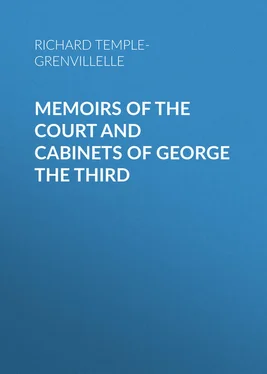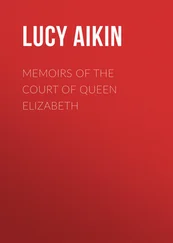Richard Buckingham and Chandos - Memoirs of the Court and Cabinets of George the Third
Здесь есть возможность читать онлайн «Richard Buckingham and Chandos - Memoirs of the Court and Cabinets of George the Third» — ознакомительный отрывок электронной книги совершенно бесплатно, а после прочтения отрывка купить полную версию. В некоторых случаях можно слушать аудио, скачать через торрент в формате fb2 и присутствует краткое содержание. Жанр: foreign_antique, foreign_prose, на английском языке. Описание произведения, (предисловие) а так же отзывы посетителей доступны на портале библиотеки ЛибКат.
- Название:Memoirs of the Court and Cabinets of George the Third
- Автор:
- Жанр:
- Год:неизвестен
- ISBN:нет данных
- Рейтинг книги:5 / 5. Голосов: 1
-
Избранное:Добавить в избранное
- Отзывы:
-
Ваша оценка:
- 100
- 1
- 2
- 3
- 4
- 5
Memoirs of the Court and Cabinets of George the Third: краткое содержание, описание и аннотация
Предлагаем к чтению аннотацию, описание, краткое содержание или предисловие (зависит от того, что написал сам автор книги «Memoirs of the Court and Cabinets of George the Third»). Если вы не нашли необходимую информацию о книге — напишите в комментариях, мы постараемся отыскать её.
Memoirs of the Court and Cabinets of George the Third — читать онлайн ознакомительный отрывок
Ниже представлен текст книги, разбитый по страницам. Система сохранения места последней прочитанной страницы, позволяет с удобством читать онлайн бесплатно книгу «Memoirs of the Court and Cabinets of George the Third», без необходимости каждый раз заново искать на чём Вы остановились. Поставьте закладку, и сможете в любой момент перейти на страницу, на которой закончили чтение.
Интервал:
Закладка:
The second: "That it is the right and duty of the Lords and Commons (describing them as in the preamble to the Bill of Rights) to provide the means of supplying the defect in the personal exercise, &c., in such manner as the exigency of the case may appear to them to require."
The third: "That for the above purpose, and for maintaining entire the constitutional authority of His Majesty, it is necessary that the said Lords and Commons should determine on the means by which the royal assent may be given in Parliament to such Bill as may be passed by the two Houses, respecting the exercise of the royal power, in the name and on the behalf of His Majesty, during the continuance of His Majesty's indisposition."
I believe I have given you very nearly the words, which I ought to remember, having employed very near the whole of two days in settling them with Pitt and our lawyers.
Our principle is, that the King's authority remains entire. That no legislative act can be done but with the formal sanction of his assent. That no person can take upon him to give that assent, except by the direction and authority of the two Houses, who have the right, in the present emergency, to act for the King; but must, even in doing that, adhere as nearly as possible to the forms of the Constitution.
Fox opposed these resolutions, in one of the best speeches I ever heard from him; but I think indiscreetly supporting and enforcing all his old ground of the Prince of Wales's right. Towards the end, he made a violent personal attack on Pitt, intimating that he was desirous, through envy, to weaken the hands of those who were to be his successors . This opening was not neglected by Pitt, but laid hold of in a manner which enabled him to speak of his own conduct towards the King and the Prince, and towards the country in the present moment, and to contrast it with that of his opponents. I never heard a finer burst of eloquence, nor witnessed such an impression as it produced. But you will know all this better from the papers.
The division exceeded our expectations. All the neutrals, and many of the wavering people, and some of the most timid of our friends, were against us, on the ground of the inexpediency of agitating this question. You will also naturally see that something is to be allowed for the impression of two Princes of the blood speaking; one of them to assure the country that the Prince of Wales would not urge this claim, and both beseeching, as a sort of personal point, that it might not be made necessary to come to a division upon the question. Still, however, the impression which the claim itself had made on the country, was such that it was a point of real duty to quiet people's minds upon it. But it cannot be surprising, that under all these circumstances, and under the fear of some unexplained danger, many people should be caught by a previous question. I was a little mortified at finding our friend Sir P. P. among these. I had no previous intimation of this till I saw him in the division, nor have I had any opportunity of conversing with him since. I am not sure that he did not think he ought to have been a Lord of the Admiralty instead of Lord Hood. It is either that, or his intercourse with some of the Independents. On the whole, I think it better to leave him to himself, as I do not think I have sufficient influence over him to do any good, and the attempt might do harm. You know best how you stand in that respect. We have certainly no claim upon him beyond friendship and opinion.
Lord Lonsdale's people were against us, in consequence of a letter, written by the Prince of Wales himself, soliciting it as a personal favour. This, which I know from authority , may serve to give you an idea of the pains they had taken. They were so confident, that, on Sunday night, Fox assured the whole party, at a general meeting at Burlington House, that he had no doubt of beating us. I imagine that we are now sure of carrying our restrictions, and probably by a larger majority.
Lord Loraine has separated himself from the Duke of N.; in consequence of which, Rainsforth has vacated. We do not know who comes in, but Lord Loraine says it is a friend.
Gerard Hamilton is among the rats, which is no small amusement to me, who have frequently been abused by Pitt for my bad opinion of him, at the time that he was swallowing toads à toute outrance . There are one or two more individual members in the House of Commons, but nobody of any consequence but the Duke of Queensbury, which, though everybody expected it, is nevertheless a thing that raises my indignation in no small degree.
The popular opinion shows itself every day more and more, and I have no doubt you will hear of addresses, &c. Fox's declaration of the Prince of Wales's right has been of no small service to us. Is it not wonderful that such great talents should be conducted with so little judgment?
Our mode of proceeding will now be to communicate these resolutions to the Lords; and when they have concurred in them, then to bring forward the plan; and lastly, to authorize the Lord Chancellor to put the Great Seal to a commission to His Royal Highness, to empower him to open the Parliament, and afterwards to another (at least, I think they should be separate), authorizing him to give the royal assent to the Bill appointing him Regent.
You will easily see, that all this will be no very short proceeding. In the meantime, the prospect of the King's recovery is daily growing more favourable. Willis and Addington have both said, separately , that his emotion at seeing the Queen for the first time, and his subsequent agitation, instead of being discouraging, were symptoms highly favourable. He is now quite calm; and at three o'clock yesterday, the account which came from Willis was, that he was better than at any time since his illness.
It will be ridiculous if he should recover just in time to give the royal dissent to the Regency Bill – which is not impossible. The more probable supposition is, that they will just have time to parcel out the spoils, to dismiss us, and to hold their offices about a month; and so will end (if this should happen) the third reign of King Charles III.
So little was said about Ireland, that it would have been an affectation in me to have talked about it; besides this, I had no opportunity of speaking that pleased me.
Ever most affectionately yours,
W. W. G.
What I mentioned in my last about the four Princes, I now know not to be true with respect to the Duke of Gloucester, who has held aloof from all cabal with them, and even declared in the House of Lords that he had done so.
MR. W. W. GRENVILLE TO THE MARQUIS OF BUCKINGHAM.
Whitehall, Dec. 19th, 1788.
My dear Brother,
I am very sorry that this letter must necessarily be so short, as I should have great pleasure if there was time to state to you the particulars of our triumph, and of the effect which it has produced, and which is indeed little less than miraculous. It certainly exceeded my expectations; but it was so infinitely beyond what our opponents had thought possible, that they are beat down by it beyond all description. I hope you will hear all this more particularly from others. I write now only for the purpose of sending you the following paragraph from a letter of Willis's to Pitt last night, which he showed me. W. is speaking of the effect of the blisters. He says: "From this, and from several other little occurrences in the course of these last three days, I am more than ever confirmed in my opinion that there can be no doubt of the King's entire recovery."
I know the pleasure which this will give you, and therefore send it, though in great haste.
Ever most affectionately yours,
W. W. G.
MR. W. W. GRENVILLE TO THE MARQUIS OF BUCKINGHAM.
Читать дальшеИнтервал:
Закладка:
Похожие книги на «Memoirs of the Court and Cabinets of George the Third»
Представляем Вашему вниманию похожие книги на «Memoirs of the Court and Cabinets of George the Third» списком для выбора. Мы отобрали схожую по названию и смыслу литературу в надежде предоставить читателям больше вариантов отыскать новые, интересные, ещё непрочитанные произведения.
Обсуждение, отзывы о книге «Memoirs of the Court and Cabinets of George the Third» и просто собственные мнения читателей. Оставьте ваши комментарии, напишите, что Вы думаете о произведении, его смысле или главных героях. Укажите что конкретно понравилось, а что нет, и почему Вы так считаете.












